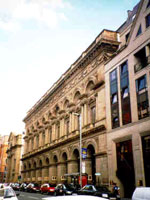Airport
Manchester Airport
IATA Code: MANLocation: The airport is situated 10 miles (17km) southwest of Manchester city centre.
Time: GMT (GMT +1 from last Sunday in March to Saturday before last Sunday in October).
Contacts: Tel: +44 (0)161 489 8000.
Transfer between terminals: The Skylink system links Terminals 1, 2 and 3.
Transfer to the city: There are regular trains between the airport and Manchester Piccadilly railway station, which has connections to destinations throughout the UK. Buses service Manchester city centre as well as other local towns and cities. National Express operates coach services to cities all over the UK. All buses, coaches and trains leave from The Station, the airport's new transport interchange that is connected to all terminals by a covered walkway. Taxis are available outside all terminals.
Car rental: Car rental companies include Avis, Budget, Europcar, Hertz, National and Sixt.
Facilities: There are restaurants, shops and bars in all three terminals. Other facilities include ATMs, bureaux de change, hairdresser and left luggage. Disabled facilities are good; those with special needs should inform their airline or travel agent in advance.
Parking: Short-term car parking is adjacent to the terminals, and a regular shuttle bus provides a free service from the long-term car parks to all terminals.
Departure tax: None.
Website: www.manchesterairport.co.uk
Visit worldtravels.com for the full guide to Manchester. Build a complete Manchester travel guide and email to your clients - sign up for a trial subscription of World Travels Pro.
Manchester

Although now best known for its football teams, Manchester was once one of England's greatest Victorian cities and the birthplace of both rail travel and Rolls Royce cars. It is situated on the east bank of the Irwell River in the north west of the country, and is the centre of a huge metropolitan area, which now encompasses the surrounding towns of Bury, Bolton, Wigan, Rochdale, Salford, Stockport and Oldham. Liverpool is just 30 miles (48km) down river. The area has long had a reputation as a drab, industrialised sprawl, but Manchester has succeeded in reinventing itself, becoming a vibrant metropolis with a nightlife second only to London. The city boasts more than 50 free museums and galleries, a world-class sports centre that recently hosted the Commonwealth Games, and plenty of parks, gardens and other attractions.
The city's architecture is largely a reminder of its central role in the cotton trade and many of the original warehouses can still be seen, although modern-day Manchester is now very different from its heyday as an industrial hub. When the city centre was badly damaged in an IRA bombing in 1996, much of the central area was beautifully renovated. Now renamed the Millennium Quarter, it is a marvellous contrast of splendid Victorian architecture and towering glass edifices, including the eye-catching Urbis exhibition centre.
Manchester is home to two of the United Kingdom's largest universities: The University of Manchester and Manchester Metropolitan University. The Royal Northern College of Music is located here as well, bringing the total to roughly 86,000 students living in the city. This large student population ensures that there is always a buzz of activity in Manchester.
Manchester City and Manchester United are two of the biggest football clubs in England and Old Trafford (home to Manchester United) has become a huge tourist destination. For those more interested in arts and culture than football, the new Lowry complex in Salford Quays boasts a fantastic selection of art galleries and theatres. The city also plays host to countless events, concerts, festivals and parades, is home to world-class bars and restaurants, and has plenty of shops and markets. Manchester is also home to the United Kingdom's largest Chinatown, and a vibrant and friendly Gay Village, concentrated around Canal and Chorlton Streets.







